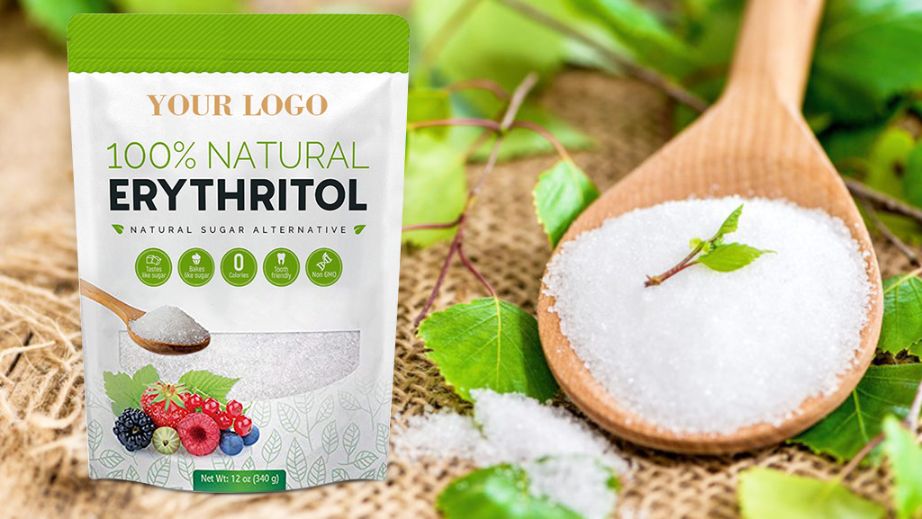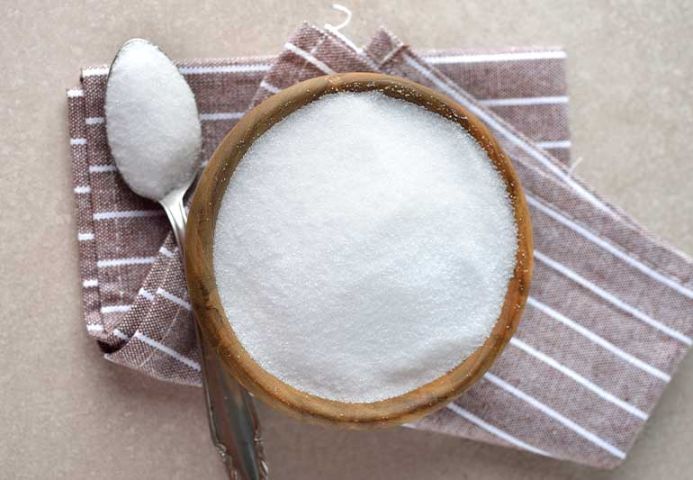Discovery of Erythritol
Early Research and Isolation
Erythritol was first discovered in 1848 by Scottish chemist John Stenhouse. He isolated it from various lichens and fungi, including the Cladonia rangiferina lichen, also known as reindeer moss. The interest in erythritol as a sugar substitute began to grow in the late 20th century, as the demand for low-calorie sweeteners increased due to the rising prevalence of obesity and diabetes.
Approval and Expansion
In the 1990s, research on erythritol gained momentum, and it was approved for use as a food additive in Japan in 1990. The U.S. Food and Drug Administration (FDA) granted erythritol Generally Recognized As Safe (GRAS) status in 1997, and its use has since expanded to other countries.

Chemical Structure and Properties of Erythritol
Chemical Structure
Erythritol is classified as a sugar alcohol, also known as a polyol. Its full chemical name is 1,2,3,4-butanetetrol, and it is a tetravalent alcohol. The molecular formula for erythritol is C4H10O4, which means it is composed of four carbon atoms, ten hydrogen atoms, and four oxygen atoms.
The chemical structure of erythritol consists of a linear carbon backbone with four hydroxyl groups (-OH) attached, one to each carbon atom. The presence of these hydroxyl groups gives erythritol its characteristic sweet taste and imparts several of its unique properties. The structure can be represented as follows:
HO-CH2-CHOH-CHOH-CH2-OH
As a member of the sugar alcohol family, erythritol shares a similar structural feature with other well-known sugar substitutes like xylitol, sorbitol, and maltitol. However, its specific arrangement of hydroxyl groups and carbon atoms gives erythritol distinct properties that set it apart from other polyols.
Physical Properties
Erythritol exhibits a range of physical properties that make it a popular choice as a sugar substitute:
- Appearance: Erythritol is a white, crystalline powder with a granular texture similar to table sugar (sucrose). Its crystal structure is orthorhombic, with unit cell dimensions of a = 8.087 Å, b = 8.736 Å, and c = 5.222 Å.
- Solubility: Erythritol is highly soluble in water, with a solubility of approximately 37 grams per 100 grams of water at room temperature (25°C). Its solubility increases with temperature, reaching about 96 grams per 100 grams of water at 80°C. This characteristic makes erythritol suitable for various applications, including cooking, baking, and beverage production.
- Sweetness: Erythritol has a relative sweetness of 60-70% compared to table sugar. Its sweetness profile is similar to that of sucrose, with a clean, sweet taste and no bitter or metallic aftertaste often associated with artificial sweeteners.
- Melting Point and Boiling Point: Erythritol has a melting point of 119-123°C and a boiling point of 329-331°C. This heat stability allows erythritol to be used in cooking and baking applications without breaking down or losing its sweetening properties.
- Hygroscopicity: Unlike some other sugar alcohols, erythritol is non-hygroscopic, meaning it does not absorb moisture from the air. This property allows it to maintain its crystalline structure and texture over time, even in humid environments.
Chemical Properties
Erythritol’s chemical properties contribute to its effectiveness as a sugar substitute and its compatibility with various food and beverage applications:
- Reducing Ability: Erythritol is a non-reducing sugar alcohol, which means it does not participate in the Maillard browning reaction, unlike glucose or fructose. As a result, erythritol does not contribute to the browning or caramelization of food during cooking or baking. This property can be advantageous in some applications where browning is undesirable, but it may require recipe adjustments for those seeking a similar appearance or texture to traditional sugar-based recipes.
- Acid-Base Behavior: Erythritol is a weak acid, with pKa values ranging from 13.4 to 15.4 for its four hydroxyl groups. This means that erythritol does not readily donate protons in aqueous solutions and has minimal impact on the pH of the final product. Its acid-base behavior also contributes to its stability in various pH environments, making it suitable for a wide range of food and beverage applications.
- Chemical Stability: Erythritol is a chemically stable compound that is resistant to hydrolysis, oxidation, and degradation at typical storage temperatures and conditions. Its stability allows it to maintain its sweetening properties and remain shelf-stable for extended periods.
- Reactivity: Erythritol is a relatively inert compound and does not readily react with other compounds or ingredients in food and beverage formulations. Its low reactivity contributes to its compatibility with various ingredients and its ability to be used in a wide range of applications without affecting the quality or stability of the final product.
- Enzymatic Activity: Erythritol is not a substrate for most enzymes found in the human digestive system, which means it is not metabolized efficiently by the body. This property contributes to its low caloric content and its suitability for people with diabetes or those looking to reduce their sugar intake.
Interaction with Water
Erythritol’s interaction with water is an essential aspect of its behavior in various food and beverage applications. Some key properties related to its interaction with water include:
- Solubility: As previously mentioned, erythritol is highly soluble in water, which makes it suitable for use in a wide range of applications, including beverages and liquid-based products.
- Hygroscopicity: Erythritol’s non-hygroscopic nature allows it to maintain its crystalline structure and texture over time, even in humid environments. This property is beneficial for shelf-stable products and ensures that erythritol-based sweeteners remain free-flowing and easy to use.
- Humectancy: Unlike some other sugar alcohols, erythritol does not exhibit strong humectant properties. This means it does not readily retain or attract moisture, which can be advantageous in certain applications where moisture retention is undesirable, such as dry mix products or powdered beverages.
- Freezing Point Depression: Erythritol has a lower freezing point depression effect than sugar, which means it does not lower the freezing point of water as effectively as sugar. This property can impact the texture of frozen products, such as ice cream, and may require adjustments in formulation or processing to achieve the desired texture.
Compatibility with Other Sweeteners
Erythritol is often used in combination with other sweeteners to achieve a specific sweetness profile or to enhance certain properties. Some common sweetener combinations include:
- Erythritol and Stevia: Stevia is a high-intensity natural sweetener derived from the Stevia rebaudiana plant. Combining erythritol with stevia can help achieve a higher level of sweetness without the bitter aftertaste sometimes associated with stevia alone.
- Erythritol and Monk Fruit: Monk fruit, also known as Luo Han Guo, is another high-intensity natural sweetener. Mixing erythritol with monk fruit can create a balanced sweetness profile and help mask any potential off-flavors from the monk fruit extract.
- Erythritol and Sucralose: Sucralose is a high-intensity artificial sweetener that is approximately 600 times sweeter than sugar. By blending erythritol with sucralose, a more balanced sweetness profile can be achieved, and the overall amount of sweetener used can be reduced.
- Erythritol and Xylitol: Xylitol is another sugar alcohol with similar sweetness to sugar. Combining erythritol with xylitol can result in a synergistic effect, enhancing the overall sweetness and improving the mouthfeel and texture of the final product.
These combinations allow for a tailored sweetness profile and the enhancement of specific properties in various food and beverage applications.
Impact on Microbial Growth
Erythritol’s impact on microbial growth is an important consideration in food safety and shelf-life stability. Unlike sugar, erythritol does not support the growth of most bacteria, yeasts, and molds. This antimicrobial property can contribute to the preservation of food products and extend their shelf life.
However, it is essential to note that erythritol alone may not be sufficient to ensure the safety and stability of a product, and additional preservation methods or ingredients may be required, depending on the specific formulation and storage conditions.
Health Effects and Metabolism
Erythritol’s unique chemical properties and metabolism in the human body contribute to its appeal as a sugar substitute. Some key health-related aspects include:
- Caloric Content: Erythritol has a very low caloric content, with only 0.24 calories per gram, compared to 4 calories per gram in sucrose. This is primarily because the human body does not metabolize erythritol efficiently, and most of it is excreted unchanged in urine.
- Glycemic Index: Erythritol has a glycemic index of 0, meaning it does not raise blood sugar levels, making it suitable for diabetics and those watching their blood sugar.
- Digestive Tolerance: Erythritol is generally well-tolerated by the digestive system and does not cause the same gastrointestinal side effects often associated with other sugar alcohols, such as sorbitol and maltitol. However, excessive consumption of erythritol may still lead to digestive discomfort in some individuals.
- Oral Health: Erythritol is non-cariogenic, which means it does not contribute to tooth decay. Some studies have even shown that erythritol may have a protective effect against dental caries, making it a preferred choice for oral care products such as chewing gum and toothpaste.
In summary, the chemical structure and properties of erythritol contribute to its effectiveness as a sugar substitute and its compatibility with various food and beverage applications. Its unique characteristics, such as low caloric content, glycemic index, and non-cariogenic properties, make it a popular choice for those looking to reduce their sugar intake and maintain a healthier lifestyle. By understanding erythritol’s chemistry and behavior in different conditions, manufacturers and consumers alike can make informed decisions about its use in various products and recipes.

Health Benefits of Erythritol
Low-Calorie Sweetener
Weight Management
Erythritol has a very low caloric content, contributing only about 0.2 calories per gram, compared to 4 calories per gram for sucrose. This makes it an attractive option for those looking to manage their weight or prevent obesity. By replacing sugar with erythritol, individuals can reduce their overall caloric intake without sacrificing sweetness in their favorite foods and beverages.
Diabetes Management
Minimal Impact on Blood Sugar Levels
Erythritol has minimal effects on blood glucose and insulin levels, making it a suitable sweetener for people with diabetes. Studies have shown that erythritol can be safely used by individuals with diabetes without causing significant changes in their blood sugar levels or insulin response.
Dental Health Benefits
Non-Cariogenic Sweetener
Erythritol is non-cariogenic, meaning it does not contribute to tooth decay. In fact, some studies have shown that erythritol may help prevent dental caries by reducing the growth of harmful oral bacteria and promoting the remineralization of tooth enamel.
Antioxidant Effects
Reducing Oxidative Stress
Some research suggests that erythritol may have antioxidant properties, which could help to protect cells from damage caused by free radicals. This is important because oxidative stress has been linked to various chronic diseases, including cardiovascular disease, diabetes, and cancer.
Gastrointestinal Health
Lower Laxative Effects Compared to Other Sugar Alcohols
One common issue with sugar alcohols is their potential to cause gastrointestinal distress, such as bloating, gas, and diarrhea. Erythritol, however, has a lower tendency to cause these symptoms compared to other sugar alcohols like sorbitol and xylitol. This is because erythritol is absorbed in the small intestine and excreted unchanged in the urine, resulting in less fermentation by gut bacteria.

Foods and Products Containing Erythritol
Erythritol can be found in a variety of foods and products, either as a standalone sweetener or in combination with other sugar substitutes. Some common foods and products containing erythritol include:
Soft Drinks
Erythritol is often used as a sweetener in reduced-calorie or sugar-free soft drinks, as it provides sweetness without adding a significant amount of calories or affecting blood sugar levels.
Sports and Energy Drinks
Some sports and energy drinks use erythritol as a sweetener to help reduce their calorie and sugar content while maintaining a palatable taste.
Flavored Water
Erythritol is sometimes used to sweeten flavored water products, providing a hint of sweetness without the calories associated with sugar.
Cookies, Cakes, and Pastries
Many reduced-calorie or sugar-free baked goods, such as cookies, cakes, and pastries, may contain erythritol as a sweetener. Erythritol is heat-stable, making it suitable for use in baking applications.
Chocolates
Sugar-free or reduced-calorie chocolates often use erythritol as a sweetener. It can be found in various types of chocolate, including milk, dark, and white chocolate varieties.
Hard Candies
Erythritol is commonly used as a sweetener in sugar-free hard candies, providing a sweet taste without the calories or dental risks associated with sugar.
Gummies and Chewy Candies
Sugar-free gummies and chewy candies may also contain erythritol as a sweetener, either on its own or in combination with other sugar substitutes.
Chewing Gum
Erythritol is frequently used in sugar-free chewing gum, as it provides sweetness without contributing to tooth decay.
Ice Cream and Frozen Desserts
Reduced-calorie or sugar-free ice creams and frozen desserts often use erythritol as a sweetener to help lower their calorie and sugar content.
Yogurt
Some reduced-sugar or sugar-free yogurts may contain erythritol as a sweetener, either on its own or in combination with other sugar substitutes.
Tabletop Sweeteners
Erythritol is available as a granulated or powdered tabletop sweetener, often sold under various brand names. It can be used as a sugar substitute in beverages, cooking, and baking applications.
How to Consume Erythritol
When incorporating erythritol into your diet, consider the following tips and recommendations:
Start with Small Amounts
If you are new to erythritol or other sugar alcohols, it is a good idea to start with small amounts and gradually increase your intake. This can help you assess your tolerance to erythritol and minimize the risk of gastrointestinal side effects.
Use in Combination with Other Sweeteners
Erythritol is often used in combination with other sugar substitutes, such as stevia or monk fruit extract, to achieve a desired level of sweetness and flavor profile. Experiment with different combinations to find what works best for your taste preferences and dietary needs.
Adjust Recipes Accordingly
When using erythritol as a sugar substitute in recipes, keep in mind that it is about 60-80% as sweet as sugar. You may need to adjust the amount of erythritol used to achieve the desired level of sweetness. Additionally, erythritol does not have the same moisture-retaining properties as sugar, which can affect the texture of baked goods. Consider adding additional moisture (e.g., water, milk, or fruit puree) or adjusting the cooking time to compensate for these differences.
Consider the Occasion
Erythritol can be used in a variety of applications, from everyday cooking and baking to special occasions. For example, using erythritol in holiday treats can help reduce the overall sugar and calorie content of your festive spread while still providing delicious, sweet flavors.
Be Mindful of Portion Sizes
Although erythritol is a low-calorie sweetener, it is essential to practice moderation and be mindful of portion sizes. Consuming excessive amounts of erythritol, particularly in combination with other caloric ingredients, can still contribute to weight gain or other health concerns.
Read Food Labels
When purchasing pre-packaged foods containing erythritol, it is essential to read food labels carefully. Look for products with erythritol listed as an ingredient, and be aware of other sugar substitutes or added sugars that may be present in the product. Additionally, check for any allergen warnings or other important information on the packaging.
Potential Challenges and Tips for Using Erythritol
While erythritol offers many benefits as a sugar substitute, it is not without its challenges. Here are some potential issues and tips for addressing them:
Cooling Sensation
Erythritol can create a slight cooling sensation in the mouth when consumed. This sensation is more noticeable in some people and can be off-putting for those who are sensitive to it. To minimize this effect, consider using erythritol in combination with other sweeteners or experimenting with different erythritol-based products to find one that suits your taste preferences.
Baking and Cooking Adjustments
As mentioned earlier, erythritol behaves differently than sugar in some cooking and baking applications. When substituting erythritol for sugar in recipes, you may need to make adjustments to the cooking time, temperature, or moisture content to achieve the desired results. Be prepared to experiment and make adjustments as needed.
Availability and Cost
Erythritol may not be as widely available as other sugar substitutes or traditional sugars, and it can be more expensive. However, as its popularity grows, it is becoming more accessible and affordable. Consider shopping online or visiting specialty stores to find erythritol products that fit your budget and dietary needs.
In conclusion, erythritol is a versatile and low-calorie sugar substitute that can be found in a variety of foods and products. By incorporating erythritol into your diet, you can enjoy the sweetness you crave without the added calories and potential health risks associated with traditional sugar. Keep in mind that erythritol may require some adjustments when used in recipes, and it is essential to practice moderation and be mindful of portion sizes. With a little experimentation and patience, erythritol can be a valuable addition to your healthy lifestyle.
Safety and Tolerability of Erythritol
Regulatory Approvals
Erythritol has been extensively studied for its safety and has received approval from several regulatory authorities worldwide. The U.S. Food and Drug Administration (FDA) designated erythritol as Generally Recognized as Safe (GRAS) in 1997. The European Food Safety Authority (EFSA) and other international agencies have also recognized erythritol as safe for consumption.
Safety Studies and Research
Numerous studies have been conducted on erythritol’s safety, including acute and chronic toxicity studies, reproductive and developmental studies, and genotoxicity studies. These studies have consistently demonstrated that erythritol is safe for consumption, even at high intake levels.
Side Effects and Tolerability of Erythritol
Gastrointestinal Side Effects
As with other sugar alcohols, erythritol can cause gastrointestinal side effects in some individuals, particularly when consumed in large amounts. Common symptoms include bloating, gas, and diarrhea. However, these side effects are typically less severe with erythritol than with other sugar alcohols like sorbitol or xylitol. This is due to erythritol’s unique absorption and metabolism characteristics, which result in a lower incidence of gastrointestinal distress.
Allergic Reactions
Allergic reactions to erythritol are extremely rare but have been reported in a few cases. Symptoms may include itching, hives, or difficulty breathing. Individuals with known allergies to sugar alcohols should consult with a healthcare professional before consuming erythritol.
Precautions and Special Populations
Pregnant and Lactating Women
Research has shown that erythritol is safe for consumption during pregnancy and lactation. However, it is essential to discuss dietary changes, including the use of erythritol, with a healthcare professional to ensure that it is appropriate for each individual’s specific needs.
Children
Erythritol is considered safe for children and can be used as a sugar substitute in their diets. However, it is essential to monitor the intake of erythritol in children, as excessive consumption may lead to gastrointestinal side effects.
Individuals with Diabetes
Erythritol has a minimal impact on blood glucose and insulin levels, making it a suitable sweetener for individuals with diabetes. Nonetheless, it is crucial for those with diabetes to consult with a healthcare professional before incorporating erythritol into their diet to ensure that it does not interfere with their overall diabetes management plan.
Interactions with Medications
There are currently no known interactions between erythritol and medications. However, individuals taking medications for diabetes or other health conditions should consult their healthcare provider before using erythritol to ensure that it does not interfere with their treatment plan.
In conclusion, erythritol is a safe and well-tolerated sugar substitute with a favorable safety profile and minimal side effects. Its low-calorie content, minimal impact on blood glucose and insulin, and lower likelihood of causing gastrointestinal distress make it an attractive option for those seeking a sugar alternative. Although erythritol is generally considered safe for consumption by most individuals, including pregnant and lactating women, children, and those with diabetes, it is important to consult a healthcare professional before making significant dietary changes. By practicing moderation and being aware of potential side effects, erythritol can be a valuable addition to a healthy and balanced diet.
Considerations for Long-term Use of Erythritol
Habitual Consumption
While erythritol is a safe sugar substitute, long-term consumption should still be approached with moderation. Overreliance on sugar substitutes may contribute to an increased preference for sweet tastes, potentially undermining efforts to reduce overall sugar consumption and promote healthier eating habits.
Dental Health
One of the benefits of erythritol compared to other sugar substitutes is its positive impact on dental health. Erythritol does not contribute to tooth decay and may even help to inhibit the growth of oral bacteria. This makes erythritol a favorable option for those concerned about dental health or looking to reduce their risk of cavities.
Weight Management
Erythritol can be a helpful tool for weight management, as it provides sweetness without the calories associated with sugar. However, it is important to remember that erythritol is not a magic solution for weight loss. Consuming excessive amounts of erythritol-containing products, particularly when combined with other calorie-dense ingredients, can still contribute to weight gain. A balanced diet and regular physical activity remain crucial components of a successful weight management plan.
Frequently Asked Questions About Erythritol Safety and Tolerability
Is erythritol safe for pets?
Erythritol is considered safe for dogs and other pets. However, it is important to note that other sugar substitutes, particularly xylitol, can be extremely toxic to dogs and other animals. Always check the ingredients of products containing sugar substitutes to ensure they are safe for pet consumption.
Can erythritol cause an upset stomach?
While erythritol is generally better tolerated than other sugar alcohols, some individuals may still experience gastrointestinal side effects, particularly when consumed in large amounts. Symptoms may include bloating, gas, and diarrhea. To minimize the risk of gastrointestinal distress, it is recommended to start with small amounts of erythritol and gradually increase intake, allowing your body to adjust to the sugar substitute.
Is erythritol keto-friendly?
Erythritol is considered keto-friendly because it has a negligible impact on blood glucose and insulin levels. It contains very few calories and does not contribute to net carbohydrates, making it suitable for low-carbohydrate diets like the ketogenic diet.
In summary, erythritol is a safe and well-tolerated sugar substitute that offers numerous benefits for those looking to reduce their sugar intake or manage their weight. With a favorable safety profile and minimal side effects, erythritol can be a useful addition to a healthy lifestyle. However, it is important to consult a healthcare professional before making significant dietary changes, particularly for individuals with specific health conditions or concerns. By practicing moderation and being aware of potential side effects, erythritol can be a valuable part of a balanced and nutritious diet.






